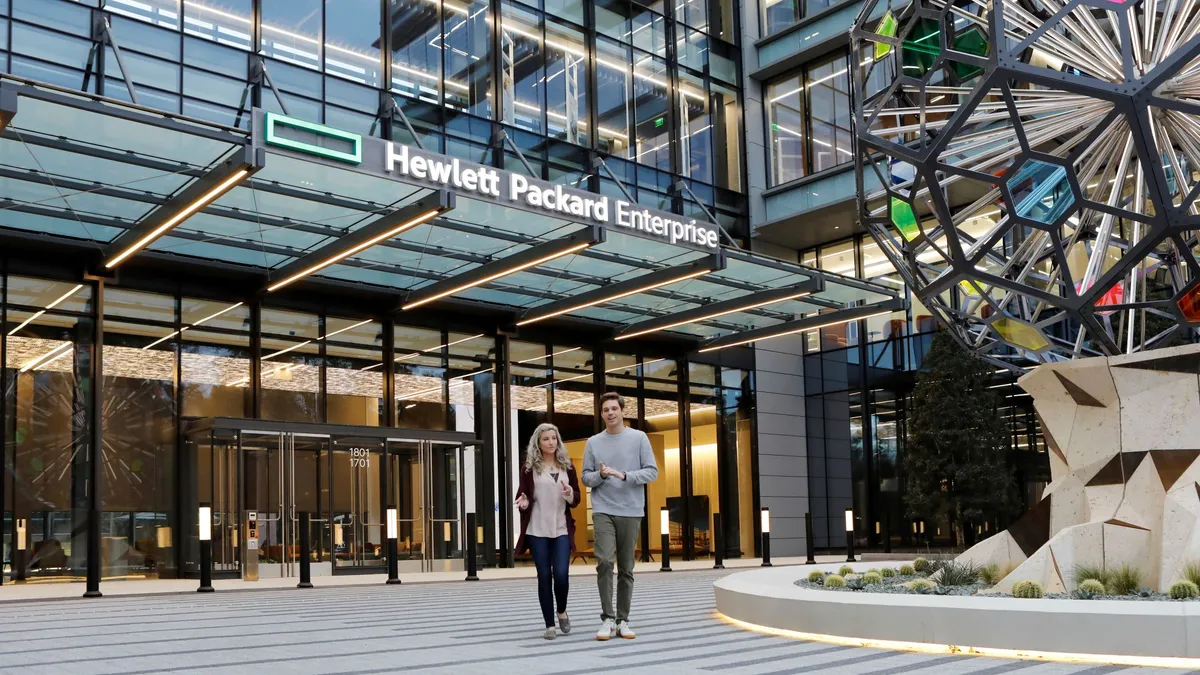Dive Brief:
- Hewlett Packard Enterprise reported robust fiscal Q4 results driven by continued interest in artificial intelligence technologies, executives said during the company’s earnings call Thursday. The company saw strong growth for both its AI server and AI system segments, according to CFO Marie Myers.
- The two segments represent two distinct areas related to the technology’s use; servers help to run AI applications, while systems refer to infrastructure including data storage, according to definitions by the IDC and the EU AI Act. Revenues for HPE’s AI server segment hit record highs of $1.5 billion for the company’s Q4, Myers said on the call.
- “We executed well in a dynamic environment, growing revenue sequentially in each segment as investments in AI are leading to infrastructure refreshes,” she said.
Dive Insight:
Revenue for the company’s server segment overall shot up by 32% year-over-year to reach $4.7 billion during the quarter, HPE said — including a 16% sequential increase for its AI server revenue, according to the company’s earnings report.
The Houston, Texas-based company also reported its third consecutive quarter of growth for AI system orders, according to its earnings presentation for the quarter ended Oct. 31. For the quarter, revenue in the segment skyrocketed by over 150%, Myers said Thursday, reaching $4.1 billion.
However, while the company booked $1.2 billion in new orders in that segment, HPE also “de-booked” a $700 million AI systems order during the quarter, “because we had concern with a specific customer,” CEO Antonio Neri said, without naming the company.
HPE prides itself on “a very strong control of this environment, and we continue to be very vigilant about how we engage and making sure we manage the risk,” Neri said. “And we felt that already carried a lot of risk, and therefore we felt it was very prudent to de-book.”
The company reported its strong Q4 results a day after tech stocks hit record-breaking values Wednesday, driven by the continuing AI boom, AP News reported. Companies such as Salesforce, Nvidia and Marvell Technology all saw jumps in their stock prices related to AI, with Salesforce seeing an 11% rise after zeroing in on “agentic AI” offerings.
Despite tech stocks’ rally, many industry experts remain split about investment into the AI market; asset manager BlackRock, for example, referred to AI as a “mega force” set to transform future economies in the 2025 outlook report also released Wednesday. Spending on AI infrastructure could reach $700 billion by 2030, about 2% of U.S. GDP, the world’s largest assets manager postulated in its outlook.
Vanguard Chief Economist Joe Davis, however, warned that investors may be overvaluing AI’s short-term potential, which could increase the risk of a coming correction to share prices, he told the Financial Times.
HPE is focused on achieving a critical balance in the AI space in the face of this uncertainty, HPE executives said Thursday.
“We have a framework that we use for our pricing, and it's absolutely our intention to remain disciplined both on cost and price as we pursue profitable growth,” Myers said in response to analyst questions on its AI systems segment. “I think that has been our mantra.”
That means the company needs to balance its “gross margin pressures” against cost control and strategic buys, Myers said. However, “we do expect, particularly in the AI space, those higher margin opportunities as we move more into seeing the adoption of sovereign and enterprise,” she said.
HPE is also looking to acquisitions to help it bolster its AI offerings in the future; in January, the company announced plans to acquire AI-native networks provider Juniper Networks for an all-cash transaction of approximately $14 billion. The acquisition has fallen under scrutiny by the U.S. Department of Justice, however, with leaders from both companies meeting with DOJ representatives last month in the hopes of finalizing the deal, Bloomberg reported.
The company expects the DOJ will continue to review the acquisition into the next calendar year, Neri said, with HPE anticipating the deal will close at some point in early 2025. The deal will represent a “big driver” for both gross and operating profit for HPE, Myers said.
“We expect that 50% of operating profit going forward will come from Juniper,” she said in response to analyst questions.















